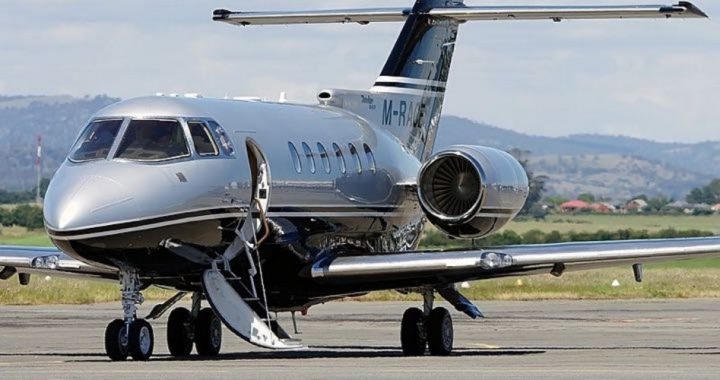
The World Economic Forum (WEF) claims that “decarbonizing the global economy in a matter of decades is the number one priority” to avoid allegedly disastrous climate change, yet the world leaders and the super-rich descending on Davos, Switzerland, for the annual summit are arriving in record numbers by private jet.
Air Charter Service (ACS), a global company based in the United Kingdom, is forecasting approximately 1,500 private flight movements at airports near Davos during the WEF, assuming this year experiences the same 11-percent year-over-year increase in traffic as last year, which saw more than 1,300 movements. PrivateFly, a U.K.-based private-jet booking service, is expecting 1,200 to 1,500 movements, “double the average daily volume of flight traffic to the area.” And Germany-based aviation tracking firm WINGSX Advance predicts 1,700 movements.
“The week of the forum is unlike any other busy private jet event, such as the Super Bowl or Champions’ League final — it’s unique for the industry in that we receive bookings from a number of our offices around the world, rather than just the one or two offices in the region where the event is being held,” ACS private jets director Andy Christie said in a press release. “We have had bookings from as far as our operations in Hong Kong, India and the U.S. — no other event has the same global appeal.”
Christie also observed “a trend towards larger aircraft,” especially “expensive heavy jets,” saying it is “at least in part due to some of the long distances traveled, but also possibly due to business rivals not wanting to be seen to be outdone by one another.”
According to CNN:
The main Zurich airport handles two-thirds of private jet travel for Davos-bound attendees, and a spokesperson said airport traffic surges by roughly 10% during this period.
Zurich airport authorities have reserved roughly 60 parking spots exclusively for Davos-related jet traffic, but it hasn’t been enough. All the spots were booked well in advance.
For the first time, the Swiss Armed Forces opened up its Dübendorf military airport to private jet passengers, and many top world leaders are expected to go through this base.
MarketWatch, which believes the climate-change hype, observes:
Air travel comes with a hefty carbon footprint, generating greenhouse gas emissions that contribute to climate change. Davos attendees will have an opportunity to discuss that issue in depth, with “Safeguarding our Planet” the title of one of the panel sessions scheduled for Tuesday. “The World Economic Forum Climate Initiative provides a global platform to help raise ambition and accelerate climate action,” according to the WEF. “Public- and private-sector collaboration is essential to create a marketplace that will enable dramatic reductions in emissions and build resilience.”
Likewise, former vice president Al Gore is scheduled to address the WEF “to stress the importance of tackling climate change,” reports Newsweek.
Jets aren’t the only carbon-emitting vehicles descending on the WEF. In fact, as HuffPost points out, “it’s a bit ironic to discuss climate change at Davos, a remote location in Switzerland that requires a tremendous carbon footprint to even get to.” It’s at least two hours’ drive from the nearest airports; impatient attendees hop helicopters instead. “Nearly 200 helicopter flights went through the Zurich airport during the last Davos event. Those helicopters carried 500 passengers, which is mind-boggling considering the event only hosts 2,500 attendees,” notes CNN.
In short, in order to meet to discuss “decarbonization,” the WEF fat cats have to spew an enormous amount of carbon-dioxide into the atmosphere.
Agence France-Presse writes:
WEF organizers insist they are making the annual forum environmentally sustainable, offsetting the carbon emissions generated by private aviation as much as possible through their own initiatives on the ground.
“We encourage our partners from business and others to take that (offsetting measures) on,” Dominique Waughray, head of Global Public Goods at the WEF, told AFP last week.
While the WEF merely “encourage[s]” attendees to offset their carbon footprint, it demands that the peons unable to afford a trip to Davos submit to draconian international agreements, such as global carbon taxes, that will further erode their standard of living — all in the name of thwarting a threat that WEF attendees’ actions show they really don’t take seriously.
Photo: Wikimedia



